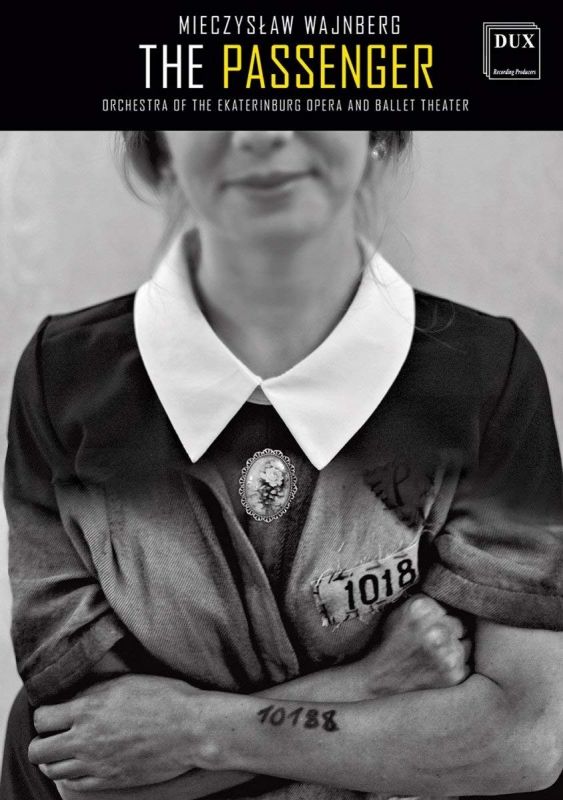WEINBERG The Passenger (Dohnányi)
View record and artist detailsRecord and Artist Details
Composer or Director: Mieczyslaw Weinberg
Genre:
Opera
Label: Dux Recordings
Magazine Review Date: 09/2018
Media Format: Digital Versatile Disc
Media Runtime: 160
Mastering:
DDD
Catalogue Number: DUX8387

Tracks:
| Composition | Artist Credit |
|---|---|
| The Passenger |
Mieczyslaw Weinberg, Composer
Aleksandra Kulikova, Bronka, Mezzo soprano Aleksei Semenishchev, First SS Officer Dmitri Starodubov, Tadeusz, Baritone Ekaterina Neyzhmak, Krystyna, Mezzo soprano Ekaterinburg State Academic Opera and Ballet Theatre Orchestra Garry Agadzhanyan, Commandant Irina Kulikovskaya, Vlasta Kirill Matveev, Third SS Officer Lubov Shevchenko, Old woman Mieczyslaw Weinberg, Composer Nadezhda Babintseva, Liese, Mezzo soprano Natalia Karlova, Marta, Soprano Natalia Mokeeva, Ivette Olga Tenyakova, Katya, Soprano Oliver von Dohnányi, Conductor Tatiana Nikandrova, Hannah Vladimir Cheberyak, Walter, Tenor Vladislav Troshin, Second SS Officer |
Author: Guy Rickards
The scenes set in Auschwitz by their very nature make extremely grim viewing but it is a tribute to Weinberg’s stage genius (and also his librettist Alexander Medvedev’s) that it is so compelling and ultimately uplifting. David Fanning has commented previously on the various controversial aspects of the score, which I will not recycle here, and Pountney’s interpretation of the climactic scene, when Martha’s fiancée, Tadeusz, plays Bach’s Chaconne instead of the boorish commandant’s favourite waltz. Weinberg scored it for the orchestral violins but Pountney – as Thaddeus Strassberger also does here – started with a solitary onstage player (the orchestral section takes it up later). Does this amount to ‘trivialising one of the most highly charged scenes in all opera’? I did not find it so when seeing it at ENO in 2011, nor the Neos/ArtHaus DVD, and again not here; the focus on the individual is all the more acute when facing the jackboot.
Strassberger’s production stands up well on its own terms, though I would have liked more light in the scenes set on the liner: it looks very dark throughout. The orchestra are well marshalled by Oliver von Dohnányi (whose discography rarely extends later than Johann Strauss), though occasionally their limitations are exposed, as in the scrappy interlude before Act 2 scene 2, ‘Workshop’; the Vienna Symphony Orchestra are markedly superior. The Russian honours go to the singers, especially Nadezhda Babintseva as Lisa and Natalia Karlova as Martha (as moving if not so radiant as Elena Kelessidi on Neos/ArtHaus). The tenderness and stillness of the ensemble at the heart of Act 2 is almost too much to bear, especially given what follows. Recorded for TV broadcast, the video direction is straightforward but effective. The subtitles and minimal synopsis are available in English, Polish and Russian only. A highly commendable issue: with fascism on the march again in central Europe, and offshoots sprouting obscenely from North America to Russia, Weinberg’s opera is increasingly relevant. As Krzysztof Olendzki, director of the Adam Mickiewicz Institute in Poland, writes in the booklet: ‘The Passenger is a shocking work. It is a guardian of memory, which should be cultivated by all.’
Discover the world's largest classical music catalogue with Presto Music.

Gramophone Digital Club
- Digital Edition
- Digital Archive
- Reviews Database
- Full website access
From £8.75 / month
Subscribe
Gramophone Full Club
- Print Edition
- Digital Edition
- Digital Archive
- Reviews Database
- Full website access
From £11.00 / month
Subscribe
If you are a library, university or other organisation that would be interested in an institutional subscription to Gramophone please click here for further information.




